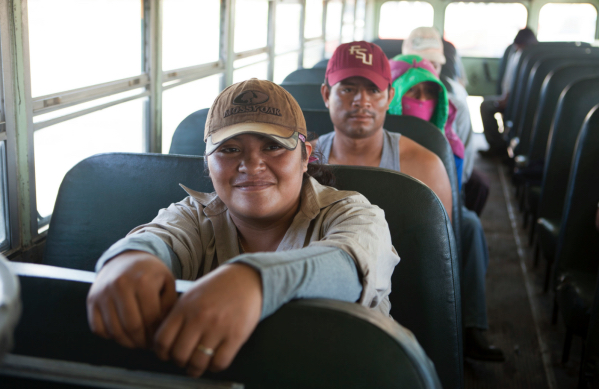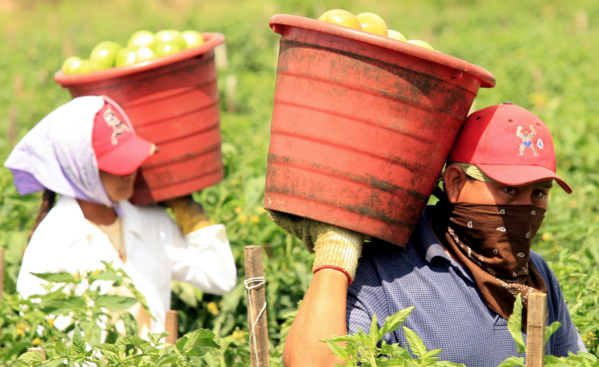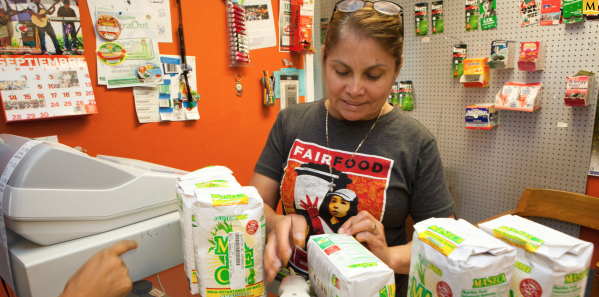
Christian Science Monitor takes a longform look at farm labor exploitation in the US, Fair Food Program progress in Florida’s fields…
With Thanksgiving just a day away — and preparations for the holiday feast already well underway in homes across the country — it is reasonable to pause for a moment to reflect on the fate of the men and women whose labor puts the food on our holiday tables. The bountiful harvest we celebrate at this time every year is still picked largely by hand, and in most of the country the conditions workers face in the fields continue to rival those documented 55 years ago in the seminal Edward R. Murrow documentary, Harvest of Shame.
The Christian Science Monitor recently published a feature article on those conditions, and on the unprecedented progress taking place in Florida’s fields today under the Fair Food Program. The piece, entitled “In Florida’s tomato fields, a fight for ethical farm labor grows,” is part of a series by Christian Science Monitor on the issue of human trafficking and is well worth the few minutes it takes to head over to the CSM site and read in its entirety.
But to give you a taste of the reporting you’ll find there, we’ve excerpted a few particularly salient passages here below. The report begins with a searing, summary description of the exploitation faced by the vast majority of the country’s farmworkers, and ends its quick sketch of farm labor abuse by contrasting conditions around the country with the hard-fought changes won in Immokalee’s fields:
… Sexual harassment and assault has for decades been part of a massive, market-driven, exploitation of largely Mexican, Haitian, and Guatemalan migrant workers. A decade ago, US attorney Doug Molloy called Immokalee and its vast corporate tomato fields the “ground zero” of human slavery in the United States. According to reports and lawsuits, abuses against both legal and illegal migrants ranged from beatings and death threats to wage theft, from illegal trafficking to unhealthy exposure to farm chemicals, as well as outright slavery and rape.
Such conditions, added to the threat of deportation, underscore how the migrant laborer in the US today remains at once the most critical as well as vulnerable player in a US agricultural sector valued at $226 billion, according to the World Bank.
Farm worker exploitation, nationally, remains routine – despite strengthened congressional protections this year. Yet for most of Immokalee’s field hands, blatant wage abuses and physical cruelty have largely – and almost suddenly – vanished from the tomato rows.
It goes on to quote several experts, from farm labor crewleader Jaime Zamora (“A lot of things have changed,” he says. “Mostly, we try to take care of each other better.”) to the Dean of the RAND Graduate School, Susan Marquis (“In the past three years, [the tomato fields in Immokalee] have gone from being the worst to the best.”), to Rutgers University Labor Economist Janice Fine (“the Immokalee workers so far have managed nothing less than ‘revolutionary changes in the structure of the agriculture sector.'”).
It even takes a look at the Fair Food label — due to debut in stores this December — and the impact it can have on building even greater consumer awareness:
.. A certified “Fair Food” label for produce that is grown and packed ethically is part of a nascent “clean labor” movement that spans from the pepper fields of South Florida to small organic farms in California’s valleys. Immokalee tomatoes certified as “clean” from labor abuses are available at Whole Foods stores throughout much of the country. This fall, Giant and Shop n’ Save in New England began carrying the label…
… Such sourcing clues can be a powerful initiative, experts say, given that the labels tap directly into a US consumer base that has begun to turn once routine shopping decisions into moral guideposts.
“The label allows personal judgment: What are you willing to tolerate and what are you willing to ignore?” says (former US attorney) Mr. Molloy. “And that’s a difficult question to avoid when the product is right there literally in folks’ shopping cart.”…
… “Labeling is a way of asserting the ability of consumers to act according to moral values that they want to implement in their lives,” says Alan Rubel, a philosophy professor at the University of Wisconsin in Madison, who specializes in information ethics and policy. “The label tells consumers the way in which their food would fit with their moral views.”
Finally, the piece ends with a look at the prospects for further success for the Fair Food Program, both as it continues to protect farmworkers’ rights here in Florida and as it undertakes its expansion to six new states and two new crops — where conditions remain unchanged — in the coming months. The CIW’s Nely Rodriguez (shown here below behind the cash register at the CIW’s staple food cooperative in Immokalee) reminds readers that, outside the confines of the Fair Food program, there is still much to be done:
… But if Immokalee shows how quickly and dramatically supply chain pressure can curb labor abuses, historic conditions here are only a sliver of an exploitation problem that fills the American shopping cart, says former Immokalee farm worker Nely Rodriguez, who, along with Silvia, now works with the Coalition of Immokalee Workers. The goal now, says Ms. Rodriguez, is to “expand the program to Georgia, Maryland, Virginia, Alabama – to every sector where farm workers are struggling.”
So, check out this great article in its entirety here, and keep the Fair Food movement in mind as you give thanks this year both for the abundant, delicious food so many of us take for granted at Thanksgiving, and for the remarkable changes taking place in Florida’s fields today thanks to the leadership of Immokalee’s workers and the CIW’s Fair Food Program.
And especially remember those 1.5 million farmworkers still working in difficult, often brutal conditions in fields that are not yet part of the Fair Food Program. Change is going to come to those fields as it has in the tomato industry in Florida, but it will take time, and in the meantime, as the Christian Science Monitor reminds us, those workers continue to suffer some of the harshest conditions in the US labor market today.


